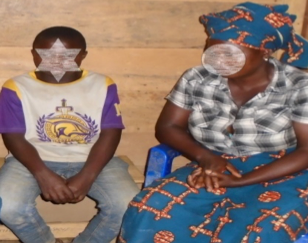Saved by my Son: A Tushinde Ujeuri Success Story
“The support from the Tushinde program has restored my will to live.”
Tushinde Ujeuri Project brings hope to one survivor of sexual and gender-based violence in DRC
It was mid afternoon, and my 10 year-old son and I were walking home from working in the fields. When we were close to the forest, a group of five armed people stopped us. They had machetes and guns.
They made us take off our clothes. They beat us and, as if this wasn’t enough, they raped me one by one, forcing my son to watch. I was screaming in pain.
As the third one was about to start raping me, my son jumped over me to protect me with his body. That’s when my attackers saw people about to pass by. The men ran away, leaeving us like that on the side of the road.
The passers-by came to rescue us and saw the state we were in, they immediately took us to the Santé Plus Health Center, a few kilometers away, for medical attention. After that, we were transferred to the Walikale General Hospital.
“I was shaken. I lost taste with life.”
I was completely miserable and depressed following this traumatic incident. The event is hard to explain with words. I was shaken. I lost taste in life. Each time I saw my son, it was as if I had lost my mind. I even fainted sometimes. My husband tried everything to comfort me but it left me numb. My whole life was buried under the weight of this trauma.
A psychosocial agent for the Tushinde Ujeuri project met me at home and put me in contact with a therapist.

The nurses organized a meeting with the psychosocial assistant who listened to us and gave us moral support. A psychosocial agent for the Tushinde Ujeuri project met me at home and put me in contact with a therapist. We had several sessions together.
The support from the Tushinde program has restored my will to live. My life changed and is improving. I started to work again, even though I am still scared to go to the field alone. I have also accepted my son again. He is also much better, and today I feel at peace.
In the DRC, humanitarian actors assist approximately 30,000 survivors of sexual and gender-based violence per year.
According to the UNFPA, approximately 30,000 survivors are treated annually for various forms of SGBV including rape, sexual slavery, trafficking, forced/early marriage, intimate partner violence, and sexual exploitation and abuse.
IMA's DRC Sexual and Gender-Based Violence program has made great headway in countering gender-based violence through an array of projects. Its PEP Kit Procurement and Distribution program facilitated the treatment of more than 15,000 SGBV survivors in 2019.
ASSP's Ambassador program hosted 2,034 movie nights in villages across five provinces to share the award-winning Girl Rising film to advocate girl's education.
And finally, IMA's Tushinde Ujeuri is currently leading the way in some of Eastern DRC's most difficult to reach places, providing psychosocial support to nearly 10,000 survivors in its first two years.
Tushinde Ujeuri
Follow the link below to learn more about IMA's Tushinde Ujeuri program to counter gender-based violence in the DRC.
Gender & SGBV
Tushinde Ujeuri - Counter Gender-Based Violence Program's HOLISTIC SEXUAL- AND GENDER-BASED VIOLENCE PREVENTION AND RESPONSE MODEL (pdf)
SGBV Response through Post-Exposure Prophylaxis (PEP) Kit Procurement and Distribution Phase II - February 2020 (English)(français)
PEP Kit Procurement in the DRC - January 2020 (pdf)
Girl Rising, ASSP-ENGAGE Final Report – March 2017 (pdf)
Quick Facts
More than 40,000 survivors have received counseling through the Ushinde and Tushinde projects
More than 20,000 survivors have received urgent and free medical care through the Ushinde and Tushinde projects
Nearly 21,000 PEP kits have been distributed to survivors via the ASSP, Tushinde, and PEP Kit 1 and PEP Kit 2 projects.
3,418 women with fistula benefited from restorative surgery during ASSP with a general success rate of 93%.
1,680,128 new acceptors of modern methods of family planning were recruited throughout the course of ASSP.
796 survivors of trafficking have been identified and received medical, psychosocial and legal services through Tushinde.
